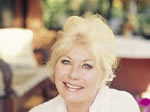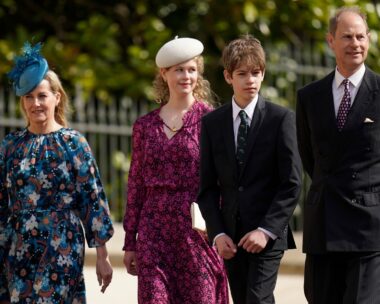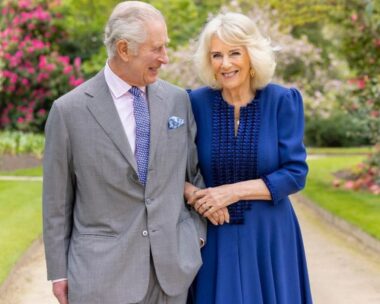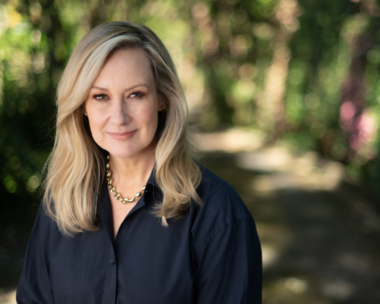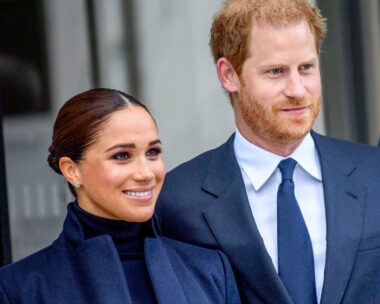Q & A with Di Morrissey, author of Barra Creek (Pan Macmillan Australia), the Great Read in the November issue of The Australian Women’s Weekly.
**Q. You have said that each book comes as a strange gift and that you wait for whatever fateful circumstances bring each novel to you – what were they in the case of Barra Creek?
A.** Well, I was planning a totally different book. I was just waiting to see which one stepped forward, and an old friend whom I felt I knew everything about, made a passing reference at a dinner party one night to working as a governess in the Northern Territory. And it hit a nerve and I thought wouldn’t that be fabulous? But I decided I wanted to go to the Gulf.
**Q. Why?
A.** I’d already set two books in the Northern Territory and I love fishing, and my partner, Boris and I had talked about going to catch barramundi, and I kept looking at Queensland thinking how fascinating it was…you know crocodiles and all that stuff and I thought it would be an interesting and dangerous environment, and that it might be fun to hook it on the governess. But the whole thing bears no resemblance in any way to my friend’s life.
What we did was we drove up the Gulf and based ourselves in Normanton and went to Karumba. In Normanton, I met a lot of governesses who had worked up there. They go up to work and hook a good bush guy, and stay there. And so again, I thought well, what’s in Normanton – so I rang and I finally got onto the Normanton library and the young girl who worked at the library, her family were the Gallaghers and they have big properties up there. She knew my books and was only too pleased to introduce me to her family, and they took me everywhere and were able to introduce me to all kinds of people to hear all kinds of stories. So I was able to hook into the right people at the right time.
**Q. How long did you spend in the Gulf country, researching your book?
A.** About a month. We drove and took Bunya, our Sydney silkie. We went inland into the river a little bit, [Karumba is on the coast], and that’s where all the banana prawns come from. When I lobbed there some bloke on a fishing trawler recognised me and said, ‘You’re that lady writer…geez, are you going to set a book up here and do for prawns what you did for pearls?’
**Q. (turning the tables, Di asks me) What did you think of the grisly death in Barra Creek?
A.** Fantastic, what a shocking way to go.
**Q. (me again). Where is Normanton?
A.** On the Gulf of Carpentaria, the pointy bit of Cape York, on the left hand side at the bottom, that’s where Karumba is and then 1km inland on the river is Normanton. So it’s on the Gulf of Carpentaria, on the western side of Cape York.
**Q. Tell me about the worst and the best of being up there?
A.** The best was the extraordinary landscape and the fabulous people. You meet people who live in extreme conditions – many are either totally mad, or eccentric, or absolutely wonderful. But even the eccentric ones are wonderful in their own way.
**Q. The worst?
A.** I was fearful of crocodiles. The biggest crocodile ever shot in Australia by a woman was in 1967 and it was 28 feet long, and it’s in the main street of Normanton. So the crocs were around, so walking around the water’s edge, and going out in a boat, it was a creepy feeling knowing that the red eyes are out there, looking at you. And at one point we were driving and were at a claypan in the middle of nowhere when we let Bunya out of the car for a run. All of a sudden we had whumph, whumph, whumph and a wedge tail eagle with a wing span of 10 feet circles overhead and we had to run and run to catch the dog in case it picked her up.
We met some amazing people along the way. We met this old guy who was in his 80s. He no longer walks around Australia, and he lives in a lean-to at the back of a pub. He had a little dog he was devoted to and he was nearly blind. I struck up a conversation with him because of his little dog. We had a steak meal and neither of us could finish it, so we decided to take it and give it to his dog. We finished up spending the bulk of the day in this lean-to with him telling us stories about his life.
Meeting people like that makes travelling so special. And Boris is making a documentary. He has filmed me for the last 12 months, from the day I started the book to the day I finished it. He filmed everything that happened, like the day I was sobbing because I’d erased half a chapter. On a book tour. Everything. So it will be very interesting to see what we end up with.
**Q. Are you doing anything with the documentary?
A.** We’re hoping to put it up to someone. The other idea that we’re also looking at is Di Morrissey’s Australia, because most of my books have been set in all different places around Australia. I could go back to those places and look at the landscape, and the people who inspired my books. It would be a novelist’s travelogue and I think it would be quite interesting.
When I did This Is Your Life I felt very comfortable being back in front of a camera. And I thought I wouldn’t mind doing something again, although I wouldn’t want it to be full-time. We’ll see.
**Q. Barra Creek is your 13th book?
A.** No, this is my 12th adult novel and I’m now embarking on my 13th, set in the Great Barrier Reef.
**Q. One aspect of the plot of Barra Creek that I think many people will relate to is the poisonous family relationships.
A.** Yes, I think everybody has a family story where there’s some conflict.
**Q. But it doesn’t always involve murder.
A.** No (laughing), sometimes it’s a slow death and involves more suffering.
**Q. Yes, in some cases you might be better off being eaten by a crocodile?
A.** Yes (laughing). I should tell you, too, that I had a crocodile hunter who helped me a lot. So all the croc stuff in Barra Creek is true and accurate.
**Q. I thought all your mustering detail was very good, too – do you ride?
A.** I do. But of course for my first book I went and worked on a station as a ringer. I do like to go back to the bush. It was hard to simplify without changing it or making it incorrect.
**Q. You captured the 1960s very well, were you a teenager back then?
A.** Oh, absolutely and Ita Buttrose was very helpful, in terms of the places in Sydney that were very popular then. And I made the governess a New Zealander so that she came from an ultra, super- conservative society and went from a cool, green, snowy landscape to the heat and dust of the Gulf country. I wanted it to be that kind of contrast.
I talked to a lot of the old Aboriginal and white stockmen at the retirement home in Normanton. People in their 80s and 90s. But they had fantastic memories. Some of the staff said, ‘Oh, they have nothing to say.’ But you sit down and get them talking and reminiscing – some of the nursing staff were very surprised to hear them chatting away.
**Q. Sounds like you had a fabulous adventure up there?
A.** Yes, it was.
**Q. When you’re writing one of your books, how many words a day do you aim to do?
A.** Whatever comes during the course of the day, but I have a good working day. But it’s also a good test of the book when I can’t wait to get back to it. If I get up in the morning and can’t wait to get to it, it’s a good sign that the book has got me in and I want to find out what’s going to happen. But I am pretty productive.
**Q. Do you re-draft as you go?
A.** No, I write it all the way straight through, as I don’t like to stop that journey. I wait till I finish and then I go back. All up, I probably do about four drafts.
**Q. The room you write in?
A.** I go between my little writing cabin which Boris built me and the office at home. I do the creative stuff in the cabin. Then when I’m writing stuff that requires me to make phone calls or check stuff, I do it in the office. The cabin’s a little wooden shingle cottage built in the garden at home.
**Q. There’s no phone or anything there?
A.** No, there’s power so I can plug in my laptop, and I just hear running water and see greenery. But in my mind I was in the Gulf. So much so that at one point I stepped outside the cabin, heard a rustle and it was, ‘Oh God – crocs! No, no, it’s alright, I’m in my garden.’
**Q. I have read that the actor Chips Rafferty was your mentor and unofficial godfather and that the famous poet, Dorothea McKellar, was a mentor, and of the family tragedy when your father and brother died?
A.** It’s been mentioned in articles and stuff but not dwelt upon.
**Q. Was it an accident?
A.** My father ran a water taxi service at Pittwater, north of Sydney. I think my brother, Michael, was about 14 months old. Apparently there was no-one on the boat and Michael fell overboard. My father jumped in after him and they both drowned. My father had heavy clothes on and boots which weighed him down. I think of that and when I look at my mother I wonder, how would I cope?
**Q. How old were you then?
A.** Ten.
**Q. Your mother must have been enormously strong to go on and pick up the pieces after that?
A.** Yes, because she was just a housewife and we had nothing – we were left penniless.
**Q. You went to live in LA for a period of time after that?
A.** Yes. Mum’s sister was living there and we went to be with her. We stayed there for a year and then eventually, my mother carved out this career as a TV director.
**Q. Your mother must have been an inspiration for you?
A.** Yes, very much. There is nothing I feel I can’t do, given the opportunity.
**Q. You are divorced, with two children. Tell me what they are doing now?
A.** Dr Gabrielle runs the sexology unit at Curtin University, Perth and is a writer and broadcaster. She is 32.
Nick, is an art historian completing his PhD at UCLA in Buddhist studies. He will be 30 in November.
**Q. What is your star sign?
A.** Pisces. I’m a water sign, romantic and creative, but with a Leo moon or something that gives me an enormous work ethic. I’m never late for my deadline and I’m business minded.
**Q. Your favourite colour?
A.** Emerald.
**Q. What do you hope for?
A.** That the refugee problem and lack of leadership being shown in this country is resolved very soon.
**Q. I’ve read that you once glimpsed yourself as an old lady saying you could have written books?
A.** Yes, that was something that drove me, to take the plunge, to have a bash at writing a book at what was probably the worst time of my life. But I felt if I didn’t try then, I’d never know if I could do it or not. And I’d talked about writing books since I was seven.
So I jumped off the cliff and found I could fly.
